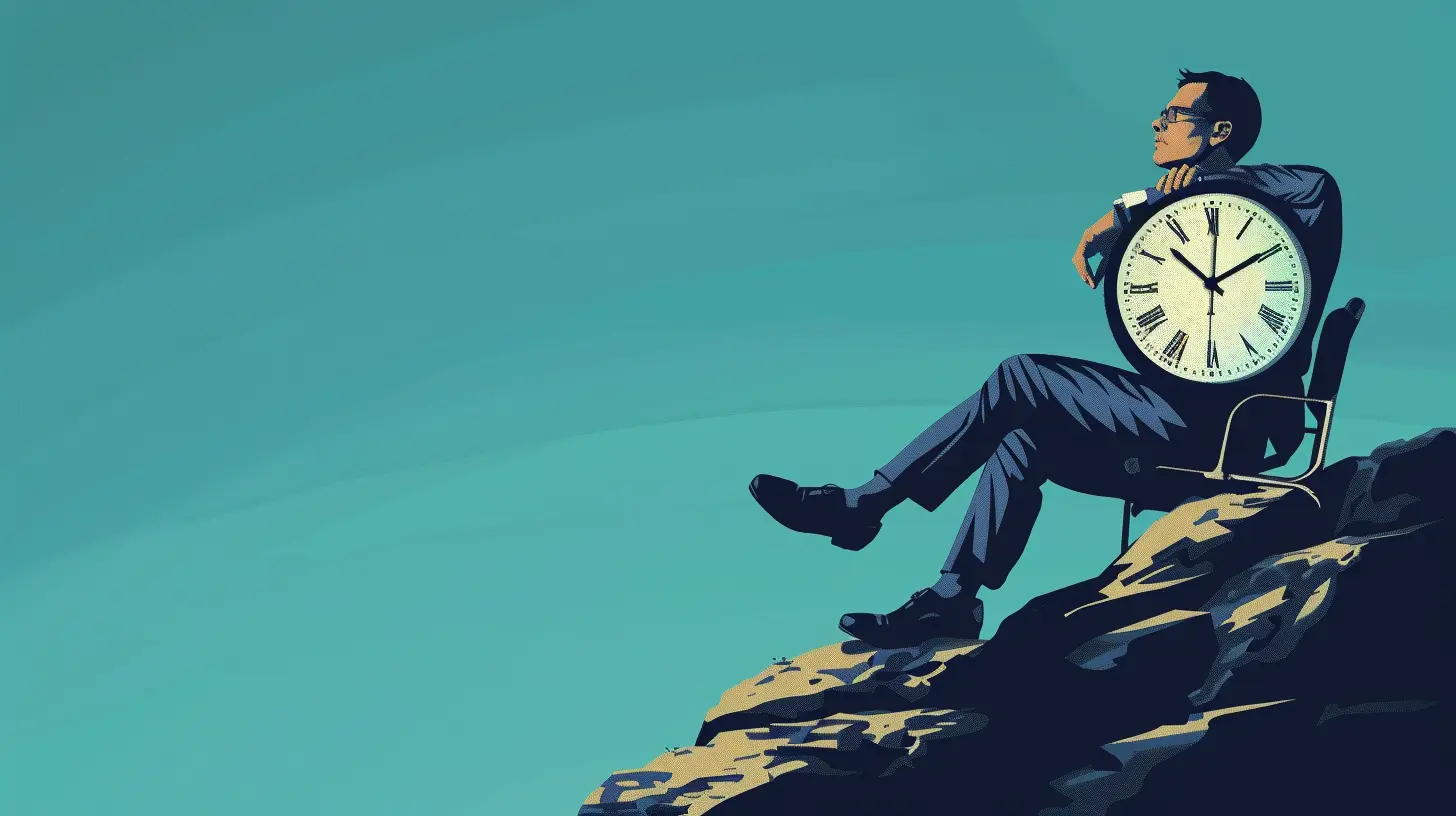The Psychology of Time Off: How Breaks Enhance Your Work Performance
5 September 2025
We live in a world that glorifies hustle. You’ve probably heard the phrase “I'll sleep when I'm dead” or seen social media posts celebrating people who "grind" 24/7. But here's the thing: constant work without real rest doesn’t make us more productive—it actually makes us less efficient, less creative, and, frankly, miserable. Sound familiar?
Taking time off isn’t a luxury—it’s a psychological necessity. In fact, the secret to doing better work might just be... not working all the time. Strange, right?
Let’s dive into the psychology of time off and break down how giving your brain a breather improves your work game—big time.
Why We Think More Work = More Success
Think about how obsessed we are with being busy. We wear it like a badge of honor. “I’m swamped” becomes a humblebrag. Society conditions us to believe that productivity means output—how many hours, how many emails, how many meetings.But here’s the catch: being busy isn’t the same as being productive. Working around the clock doesn’t equal getting more done. It often means doing less... poorly.
The Cult of Busyness
We link long hours with success. If you're not working, you're slacking off, right? That mindset is everywhere—in school, the workplace, and even in how we compare ourselves to others online. But in chasing nonstop output, we forget something important: humans aren’t machines.Your brain isn’t designed to focus intensely for 10 straight hours. It needs downtime. It craves rest to recharge, make connections, and spark creativity.
The Science Behind Taking Breaks
Let’s talk science (don’t worry—it won’t be boring). Studies from neuroscience and psychology consistently show one clear message: breaks boost performance.Here’s why.
1. Mental Fatigue is Real
Just like your muscles get tired after lifting weights, your brain gets tired after intense thinking. It's called cognitive fatigue. When you're mentally drained, you’re more likely to make mistakes, miss details, and lose focus.Taking short breaks helps reset your mental energy. Even a 5-minute walk or a quiet moment away from your screen can work wonders.
2. The Brain Works in Waves
Your brain functions in cycles of high and low alertness. It's part of a natural rhythm called the ultradian rhythm—a 90 to 120-minute cycle. After about 90 minutes of focused work, your brain starts to dip in energy. That’s your cue to step away.Ignore this rhythm, and you're basically swimming upstream. Align with it, and your work gets smoother and smarter.
3. Downtime Sparks Creative Insights
Ever notice how your best ideas come in the shower, or on a walk, not during a spreadsheet crunch? That’s no coincidence.When you're resting, your brain switches to what's called the Default Mode Network (DMN). This mode is like your brain's background processing. It connects dots, solves problems, and reflects on information.
In other words, stepping back can help you move forward.
The Types of Breaks That Supercharge Productivity
Not all breaks are created equal. Some give your brain the refresh it needs... and some just give you a chance to doom-scroll Instagram.Let’s break down the kinds of time off that actually recharge your mental battery.
1. Microbreaks (1–5 Minutes)
These are your tiny moments of pause. Stretch your legs. Look out the window. Breathe deeply. It may seem negligible, but these short pauses reduce mental fatigue, increase engagement, and help you reset.Ever tried the Pomodoro technique? That’s a focused work method that builds in short breaks every 25–30 minutes. It’s popular for a reason.
2. Lunch Breaks (Yes, Real Ones!)
Skipping lunch to keep working might feel like dedication, but it’s actually counterproductive. Taking a real lunch break—away from your desk—helps your brain switch gears and bounce back stronger in the afternoon.Plus, eating while working leads to mindless munching and less satisfaction. Your brain and your belly deserve better.
3. Weekend Breaks
Weekends were invented for a reason. Use them! Disconnect from your inbox. Put the laptop away. Go outdoors or just laze around.Regular weekend breaks help prevent burnout and keep your stress levels in check. You’ll be sharper on Monday because of it.
4. Vacations and Extended Time Off
Let’s go bigger. A full-on vacation—no emails, no meetings, no calls—can completely reset your system. Studies show that people who take vacations have better job satisfaction, improved mental health, and higher productivity after returning.Not taking time off? You’re leaving performance—and happiness—on the table.
The Performance Payoff of Rest
So what exactly happens when we take time to rest? Let's talk benefits.1. Increased Focus
Ever felt foggy after hours of work? That’s mental burnout. Breaks clear the fog.With proper rest, your brain returns to work with renewed focus. You can concentrate better, solve problems quicker, and finish tasks faster.
2. Better Decision-Making
Tired brains miss red flags. They rush decisions. Well-rested ones? They weigh options more clearly and make smarter choices.If your job requires strategy, analysis, or leadership (and let’s be real, most do), breaks aren’t optional—they’re essential.
3. Boosted Creativity
Creativity thrives in calm minds. When you press pause, you give your brain space to imagine, dream, and innovate. Remember that “aha!” moment in the shower? That’s your brain working its magic during downtime.4. Stronger Emotional Control
Stress makes us snappy. Exhaustion makes us emotional. Ever sent a grumpy email you regretted later? We’ve all been there.Breaks help reset your mood and mindset. You're more patient, more empathetic, and a better team player when you're not mentally fried.
Time Off Is Not a Weakness, It’s a Strategy
Taking regular breaks, using your PTO, and going offline isn’t slacking off—it’s sharpening your tools. High-performing professionals, top athletes, and creative geniuses all know the power of rest.Think of your brain like a smartphone. It works great until you run too many apps at once and forget to charge it. Eventually, it crashes. Or worse, it slows down so much you can’t even scroll.
Taking time off is plugging yourself back in.
Why Businesses Should Encourage Breaks
This isn’t just on you. Employers play a huge role in creating a culture that values rest. And there’s something in it for them too—breaks don’t just help individual workers, they boost overall organizational performance.Lower Burnout, Lower Turnover
Burned-out employees quit. Rested ones stay engaged. Companies that encourage time off see less attrition and higher morale.Higher Innovation
When employees have the mental clarity to think creatively, businesses benefit. Innovation thrives in minds that aren't running on fumes.Better Team Dynamics
People who aren’t overstressed are better communicators. They're more collaborative, supportive, and emotionally intelligent. And that leads to stronger teams.Creating a “Break-Friendly” Culture
So, how do we normalize breaks at work? It starts with leadership.- Encourage unplugged vacations—lead by example
- Respect boundaries—don’t expect replies at all hours
- Design workflows with breaks in mind
- Celebrate balance, not just busyness
It’s not about working less. It’s about working smarter.
Don’t Wait Until You Hit a Wall
If you wait until you're burned out to take a break, it's already too late.Build rest into your day like you build in meetings or tasks. Schedule it. Protect it. Treat it like the performance strategy it is.
Your brain—and your work—will thank you.
So Here's the Bottom Line
The psychology of time off is clear: rest isn’t a hindrance to working well—it's the fuel that powers high performance.If you want to do your best work, be your most creative self, and stay sharp long-term, take the dang break.
Close the laptop.
Go for a walk.
Take the weekend off.
Book that vacation.
It’s not downtime. It’s brain time.
all images in this post were generated using AI tools
Category:
Work Life BalanceAuthor:

Amara Acevedo
Discussion
rate this article
1 comments
Dakota Maddox
This article compellingly highlights the positive impact of taking breaks on work performance. Balancing productivity with well-being is crucial; fostering a culture that values time off can lead to happier, more efficient teams.
September 18, 2025 at 12:04 PM

Amara Acevedo
Thank you for your thoughtful comment! I completely agree that fostering a culture that values breaks is essential for enhancing both well-being and productivity.


